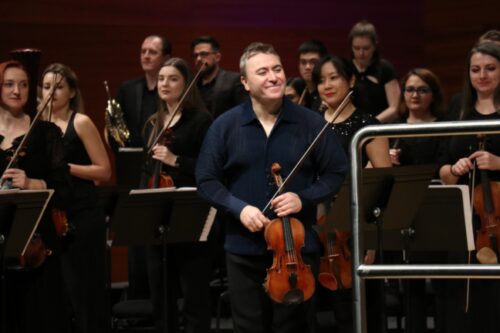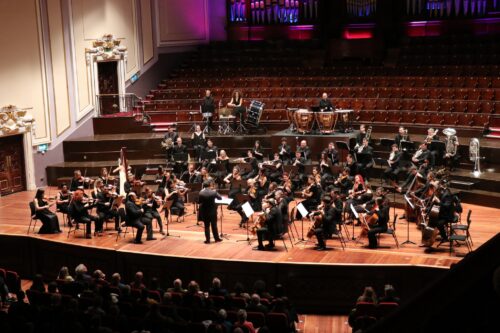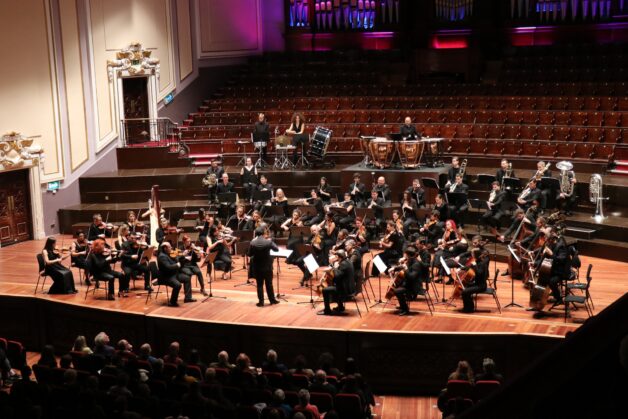 United Kingdom Various: Maxim Vengerov (violinist), Romanian National Philharmonic Orchestra / Sergey Smbatyan (conductor). Usher Hall, Edinburgh, 27.11.2022. (GT)
United Kingdom Various: Maxim Vengerov (violinist), Romanian National Philharmonic Orchestra / Sergey Smbatyan (conductor). Usher Hall, Edinburgh, 27.11.2022. (GT)

Sibelius – Karelia Suite, Op.11
Alexey Shor – ‘Enchanted Moment’ for Symphony Orchestra; Seascapes for Violin and Symphony Orchestra
Prokofiev – Violin Concerto No.1 in D major, Op.19
Tchaikovsky – Romeo and Juliet Fantasy Overture, TH 42, CW 39
This is the first ensemble from Romania to visit Edinburgh as part of the ‘Sunday Classics’ series. It is surprising because this country is rich in musical history; one of the twentieth-century’s finest musicians was George Enescu, whose colourfully written rhapsodies often adorn encores by visiting orchestras, yet much of his music is unknown. Enescu was also a great teacher, conductor and violinist who influenced many, including Yehudi Menuhin and several generations of violinists. Sergiu Celibidache is another outstanding figure who was a great conductor, as was Constantin Silvestri. Perhaps, Romania’s greatest exports are Radu Lupu, Dinu Lipatti and Angela Gheorghiu.
The Romanian National Philharmonic is from the regional centre of Brasov and was established in 1878 as the Kronstädter Philharmonische Gesellschaft under the conductor Anton Brandner. Of course, Romania was part of the Habsburg Empire, with German culture prevalent. Today, the Brasov Philharmonic organise as many as 160 concerts annually, with many international artists invited for both chamber and orchestral concerts.
The opening Karelia Suite allowed us to judge the standard of performance of this orchestra; the piece is from Sibelius’s incidental music for a patriotic play based on the region which historically has been fought over between Finland and its neighbour Russia. The fifty-minute piece depicts the historic events from 1293 through to the sixteenth century, and here the composer selected three extracts as an engaging patriotic suite. The Intermezzo opened with the rustling strings as a setting for the entry of the magical horn calls, and magnificent trumpets – and it was nice to see the smiles on some of the musicians as they listened to their colleagues. In the Ballade, the violins were not always together, yet the orchestra showed it has a fine woodwind group, and there was especially fine playing from the cor anglais of Cristina Tegzeșiu, invoking a minstrel singing. The strings came together in the Alla Marcia with bright harmonies and the brass showed off their virtuosity splendidly, and there were superb contributions from the flutes of Anna Ferraz and Iria Castro Real.
I have never heard anything by the Ukrainian-born, U.S. citizen Alexey Schor (b.1970), however he is clearly a master of orchestration. His colourful ‘Enchanted Moment’ opened lustrously with tuneful sparkling melodies, somewhat evocative of Leonard Bernstein’s most successful dance rhythms with great playing from the flute of Ferraz and there was more than a hint too of Shostakovich from the strings and in the breezy jazzy harmonies from the excellent brass groups. This brief piece was commissioned for this concert tour and served to show off the best of this orchestra’s talents.
Shor’s Seascapes for Violin and Symphony Orchestra was originally written for viola and orchestra and rewritten for the violinist Maxim Vengerov who joined the orchestra for this brightly written rhapsodic work. The opening movement (Abandoned Lighthouse) began on the violin with an evocative theme echoed by the horn, and this rather wistful idea developed in the orchestra leading to a series of variations in what was a rather cinematic idiom. The second movement (Lonely Sail) was soulful and melancholic, yet often sounded like a passage from a schmaltzy American movie. The third movement (Gathering Storm) became more dramatic and exciting – it is clear the composer has fine musical gifts yet lacks the depths of thought to merit prolonged attention. The final movement (Summer Hail) was a lively and upbeat sequence with sparkling exchanges between Vengerov and the flutes of Ferraz and Real, and the brass groups.
The Prokofiev First Violin Concerto offered Vengerov much more to work with and a fresh opportunity to display his world-class talents. The Siberian-born violinist last appeared here four years ago when he made a notable Edinburgh conducting debut with the Würth Philharmonic. On that occasion, he certainly displayed fine interpretative talents and he continues to develop a career as a conductor. He is too young, however, to discard his violin and here he showed that he remains firmly among the finest violinists of his generation.
This was clear from the opening lyrical passages of the Andantino and he was marvellously accompanied by Ferraz on the flute and the harp against the shimmering violins, all of which fashioned a magical idiom. This was violin playing of sublime quality and I cannot remember a better performance of this concerto in the concert hall. Most notably this was evident in a wonderful section accompanied magnificently by the eloquent clarinet of Zé Pinto. The mysterious lyricism was broken in the brief Scherzo with tersely energetic playing, when Vengerov underlined his great virtuosity, and the conductor Sergey Smbatyan showed his skills in allowing the violin to be heard clearly against the brass groups.
In the finale (Moderato) the bassoons of Mihai Marunțelu and Mircea Moisi offered a livelier sequence of music making and there was some spellbinding mastery from the Siberian maestro with startling blends of lyricism and exciting colourful gaiety accompanied by the virtuosi of Evelina Andries on the harp, the tuba of Adam Cooper, and once more the lovely flute of Ferraz, all recreated the magical, child-like idiom of this great concerto.

In the Tchaikovsky Fantasy Overture there was an extended opportunity to judge the virtuosity of these players under this conductor. The opening passage seemed to my ears a bit bland, the music making improved as the strings produced some marvellously eloquent and impassioned ensemble playing, and I was particularly impressed by the outstanding viola group and the double basses. The cor anglais of Tegzesiu was particularly noticeable in her masterly intonation, equalled by the eloquence of the oboes of Pablo Balaguer Ortiz and Lavinia Opriş, and the colours of the clarinet by Pinto, Maruntelu and Moisi on the bassoons, and the velvety harmonious violins.
Under this Armenian conductor, the vividly bright romanticism surged through the orchestra enhanced with great playing from the horns, and there was much fervent passion in the strings bringing out all the despairing heartbreak of the two lovers. The drama of the music was voiced well on the grand casa by Simona Piron, the glorious trumpets, and the timpani by Gabriel Barani, at times, it seemed that the conductor was adopting too fast a tempo, yet before the dramatic close he allowed the pace of the music to flow to its exciting yet tragic culmination.
This was a fine concert, yet one of two halves, with the standards much improved in the second half. The Romanian orchestra play a second concert in Scotland at Perth before visiting venues throughout the UK before closing their tour in London on December 6. We shall have another opportunity to see Sergey Smbatyan again when the Armenian State Symphony Orchestra visit in February.
Gregor Tassie
